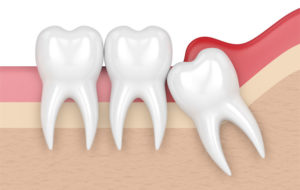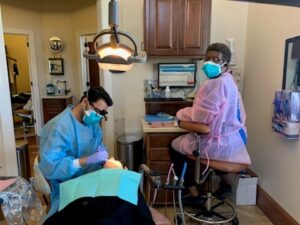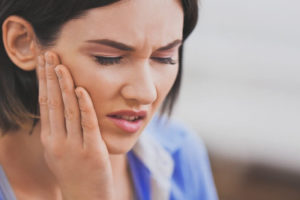Gaps in teeth, also known as diastema, are spaces between two or more teeth. While some people embrace their tooth gaps as a unique feature, others wonder about the causes behind this dental condition. Is it something inherited from your parents, or are other factors at play? In this article, we’ll dive into the causes of gapped teeth, explore whether they’re genetic, and discuss if gaps are unhealthy or fixable.
What Causes Gapped Teeth?

There are several reasons why gaps may form between teeth. Some of these are related to genetics, while others stem from habits, dental health, or the natural growth of your jaw.
Genetic Factors
- Size and Shape of Teeth:
If you inherit teeth that are smaller than average or a jaw that is larger than average, gaps are more likely to appear. - Missing or Extra Teeth:
Genetic conditions that lead to missing or extra teeth can cause gaps. When a tooth is missing, the neighboring teeth may shift, leaving empty spaces. - Frenum Attachment:
The labial frenum is a strip of tissue that connects your upper lip to your gums. If this tissue is too thick or extends too far between the front teeth, it can create a gap.
Non-Genetic Factors
- Habits in Childhood:
Thumb-sucking, tongue thrusting, or prolonged use of a pacifier can push teeth apart and create gaps. - Gum Disease:
Gum disease weakens the bones and tissues that support your teeth, which can lead to shifting and the development of gaps. - Natural Growth:
Gaps are sometimes a normal part of childhood as baby teeth fall out and adult teeth come in.
Are Teeth Genes from Mom or Dad?
Your teeth, like most physical traits, are influenced by a combination of genes from both parents. This means you might inherit a mix of dental features from your mom and dad.
Key Genetic Influences on Teeth:
- Jaw Size and Shape:
If one parent has a wide jaw and the other has smaller teeth, you might end up with gaps. Conversely, if one parent has a small jaw and the other has large teeth, you could experience crowding. - Tooth Alignment:
The way your teeth naturally align is also influenced by genetics. If either of your parents has gapped teeth, you’re more likely to have them too. - Tooth Growth Patterns:
Delays or irregularities in tooth eruption can sometimes be inherited, leading to gaps or other alignment issues.
While genetics play a big role, it’s important to remember that environmental factors, habits, and dental health can also affect how your teeth grow and align.
How Rare Is It to Have a Gap in Your Teeth?
Gapped teeth are relatively common, especially among children.
Prevalence of Gapped Teeth:
- In Children:
Many kids experience gaps between their baby teeth. This is a natural part of growth as the jaw develops and makes room for adult teeth. These gaps often close on their own as permanent teeth come in. - In Adults:
Gaps are less common in adults but are still seen in a significant portion of the population. Some adults keep the gaps they had as children, while others may develop new gaps due to shifting teeth or gum issues.
Cultural Perceptions of Gaps:
In some cultures, tooth gaps are seen as a sign of beauty or luck. This has led many people to embrace their gaps as a unique and attractive feature.
Are Tooth Gaps Unhealthy?

In most cases, tooth gaps are not inherently unhealthy. However, they can sometimes lead to or signal other dental issues.
When Gaps Are Harmless:
- If the gap doesn’t affect your ability to chew, speak, or clean your teeth, it may not require treatment.
- Gaps that result from natural growth or genetics are often purely cosmetic concerns.
Potential Problems from Gaps:
- Food Trapping:
Gaps can allow food to get stuck more easily, increasing the risk of plaque buildup and cavities. - Gum Health Issues:
Spaces between teeth may leave gums exposed, making them more vulnerable to irritation or infection. - Bite Problems:
Large gaps can sometimes affect your bite, leading to uneven pressure on your teeth and jaw. - Speech Difficulties:
In some cases, large gaps, especially between the front teeth, can cause slight speech impediments.
If you’re concerned about the health impact of your gaps, it’s a good idea to consult a dentist.
Can You Fix a Teeth Gap Naturally?
Fixing a tooth gap naturally, without dental procedures, is possible in some cases but not all.
Situations Where Gaps May Close Naturally:
- In Children:
Gaps in baby teeth often close on their own as adult teeth come in. This is a natural part of dental development. - Mild Cases:
If a gap is caused by shifting teeth, wearing a retainer or addressing the underlying issue (like gum disease) may help.
When Natural Fixes Don’t Work:
For larger or persistent gaps, professional treatment is usually required.
How to Fix Gaps Professionally

If your gap doesn’t close on its own or if you’re unhappy with it, there are several effective dental treatments available.
Popular Methods to Fix Gaps:
- Braces:
Traditional braces can move teeth closer together over time, closing gaps of all sizes. - Invisalign or Clear Aligners:
For mild to moderate gaps, clear aligners are a less noticeable alternative to braces. - Dental Bonding:
Dentists can apply a tooth-colored resin to close small gaps, improving the appearance of your smile. - Veneers:
Porcelain veneers are thin shells that cover the front of teeth, making gaps less noticeable. - Frenectomy:
If a thick labial frenum is causing the gap, a minor surgical procedure called a frenectomy can help. - Dental Implants or Bridges:
For gaps caused by missing teeth, implants or bridges can fill the space permanently.
Do Gaps in Teeth Go Away with Age?
Gaps don’t typically close on their own as you age. In fact, they may become more noticeable over time due to natural changes in your teeth and jaw.
Why Gaps May Widen Over Time:
- Shifting Teeth:
Teeth naturally shift as you age, which can make gaps larger. - Gum Disease:
If untreated, gum disease can lead to bone loss, causing teeth to move and gaps to form or widen.
What You Can Do:
Regular dental checkups and good oral hygiene can help maintain the alignment of your teeth and prevent gaps from worsening.
Final Thoughts
Gaps in teeth are often caused by a mix of genetic and environmental factors. While they’re usually not a serious health concern, they can sometimes lead to issues like difficulty cleaning or gum irritation. If you’re worried about a gap or want to improve your smile, there are both natural and professional ways to address it.
Whether you choose to embrace your gap as a unique feature or explore treatment options, maintaining good oral hygiene and consulting with a dentist will ensure your teeth stay healthy and strong.









